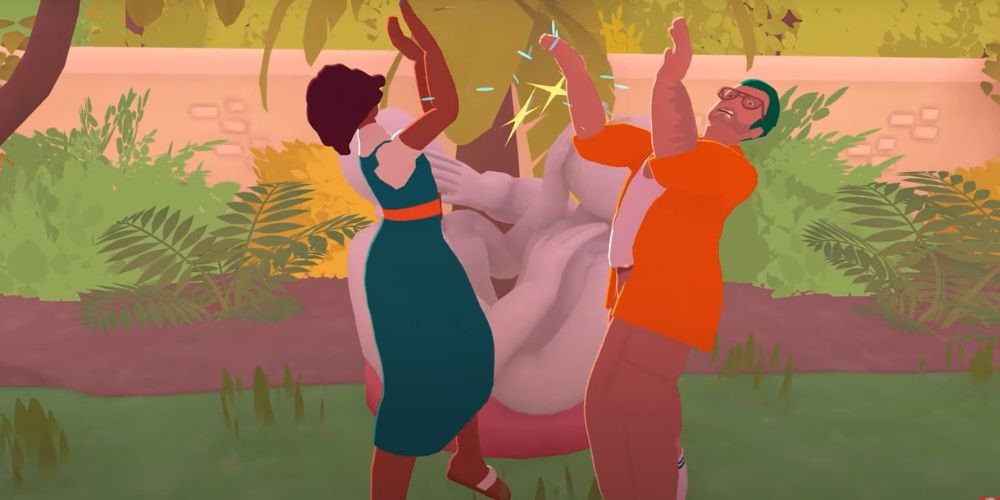
Reality television remains a captivating, albeit controversial, element of modern entertainment. While many revel in the sensationalized drama and the roller-coaster of human emotion it often showcases, there lies an inherent duality that complicates our enjoyment. The distinction between performers and spectators blurs, particularly in a genre steeped in exploitation and hyperreality. Among the plethora of reality shows, *The Crush House* rises as a self-aware parody that adeptly critiques the very forces that drive modern television. Through its unique structure, it invites viewers to navigate not just the superficiality of reality TV, but also the underlying truths that each frame captures.
The Setting: A Plastic Paradise

Welcome to *The Crush House*, a bubblegum pink mansion situated on the sun-soaked shores of Malibu. On the surface, it appears to be a dream location, replete with palm trees, vibrant neon decor, and inflatable flamingos. However, beyond the alluring façade lies a complex system designed to cater to a ravenous audience hungry for drama and intimacy. As the producer of a 90s-inspired reality show, your job is to distill human experiences into compelling content that satisfies competing viewer archetypes.
Playing the Producer
Every day in *The Crush House* begins in a dingy basement, where aspiring TV producers pick up their camcorders to enter the vibrant yet treacherous world upstairs. You’re not merely a bystander; your role necessitates actively participating in the chaos. It’s your job to record daily interactions laden with tension and romance while simultaneously monitoring audience reactions streaming in via live chat. Different groups—like the Drama Queens and the Sexy Seekers—clamor for varying forms of entertainment, from trivial quarrels to steamy connections. Intricate icons on screen provide cues for when audience satisfaction is at its peak, revealing a frenzy of activity as you juggle demands.
The Chase for the Perfect Shot
The thrill of the chase becomes evident as you dart between cast members, hyper-aware of the shifting audience dynamics. In one moment, you might capture a standoff between rival characters, and in the next, you’re racing to record an unexpected romantic connection in the secluded corners of the mansion. The dynamics shift dramatically over time, pushing you to adapt to the increasingly complex demands of the viewers, all while navigating the cast’s evolving relationships. The reality is that attention spans are short, and failure to impress can spell disaster for your show.
The Satirical Edge

The Characters: Archetypes with Depth
The cast of *The Crush House* embodies a mix of archetypes commonly encountered in reality series, yet they interact with an added layer of complexity and diversity. As you select your favorite characters, ranging from the endearing himbo Alex to the 'sexy ice queen' Joyumi, each brings their own brand of drama. However, it’s worth noting that as you replay the game, some of the dialogue may be shared among characters, which risks diluting their individuality. This shared experience underscores the chaotic nature of reality TV and offers a provocative look at how personalities can merge into one sensational yet fragmented narrative.
Breaking the Illusion
As you delve deeper into the game, the once pristine surface cracks. The storyline takes a darker turn as you’re beckoned to explore enclosed areas of the mansion, uncovering a looming sense of dread hidden beneath the glossy veneer. The cast begins to reveal their true selves, seeking your aid in navigating the treacherous landscape of their televised personas. The tension amplifies as the Network’s rules—maintaining distance from the cast and prioritizing audience favor—start to fray. These moments of sincerity and vulnerability not only challenge the boundaries set by the production but also serve as a poignant commentary on the nature of reality TV itself.
The Multiple Endings: Discovering the Truth

The conclusion of your journey in *The Crush House* hinges on the delicate balance between production demands and human complexity. Each ending presents a unique revelation about the mechanics of reality TV—a mirror to the very experiences you shape behind the camera. The dynamic between producer and cast reveals the inherent contradictions of a genre that perpetuates fantasies while simultaneously exposing shadows hidden in the spotlight. The ultimate truth lies within the notion that reality TV can be both an escape and a prison, offering a superficial paradise while masking deeper truths.
Final Thoughts
*The Crush House* stands out as a clever exploration of the reality television genre, showcasing not just its inherent absurdity but the intricate dance between producer and cast within an artificial environment. The game pushes boundaries and forces players to confront uncomfortable truths lurking beneath the bright colors and flashy constructs. It’s a reflection on our own complicity in this system, reminding us of the spectacle we consume and the very real lives that exist behind it. As you wrap up the experience, you’re left with questions about authenticity, commodification, and the duality of escapism — compelling you to reconsider what you watch and why. For anyone intrigued by the complex tapestry of reality TV, *The Crush House* is not just a game but a provocative commentary worth tuning into.
In conclusion, whether you relish the drama or engage with the underlying critique, the experience offers a unique lens through which to analyze the genre. Reality TV has never felt more unfiltered, and *The Crush House* invites you to take a hard look at the interplay between performance and reality.


